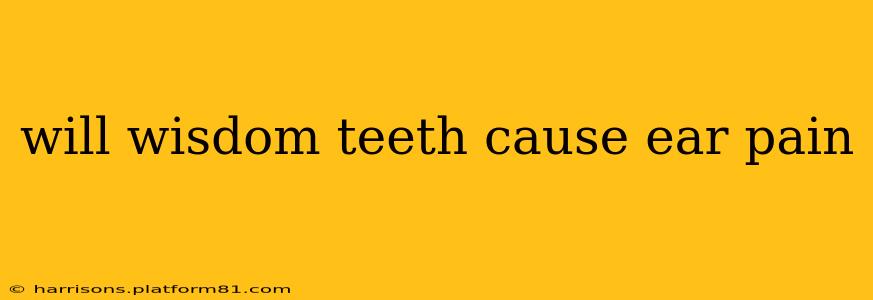The emergence of wisdom teeth, or third molars, can be a surprisingly complex process, often leading to more than just jaw discomfort. Many people experience ear pain alongside wisdom tooth problems, leaving them wondering if there's a direct connection. The answer is a resounding yes, but understanding why this happens is key. This article will explore the link between wisdom teeth and ear pain, addressing common questions and concerns.
Why Do Wisdom Teeth Cause Ear Pain?
The reason wisdom teeth can cause ear pain isn't directly related to the teeth themselves touching the ear. Instead, the pain is often referred, meaning it's felt in a different location than the actual source. This is due to the intricate network of nerves in the head and jaw. The trigeminal nerve, a large cranial nerve responsible for sensation in the face and jaw, also sends signals from the area around the wisdom teeth to the brain. When inflammation or infection occurs around a wisdom tooth (pericoronitis, impaction, etc.), the brain interprets these nerve signals as pain, sometimes mislocating it to the ear.
What Kind of Wisdom Tooth Problems Cause Earache?
Several wisdom tooth issues can trigger ear pain:
- Impacted Wisdom Teeth: When wisdom teeth don't have enough room to erupt fully, they become impacted. This can lead to pressure, inflammation, and infection, all of which can cause referred pain in the ear.
- Pericoronitis: This is an infection of the gum tissue surrounding a partially erupted wisdom tooth. The inflammation and swelling put pressure on the surrounding nerves, resulting in ear pain, along with jaw pain and swelling.
- Infection: An infection in or around a wisdom tooth can spread, potentially affecting nearby structures and nerves, thus leading to ear pain. This infection can manifest as an abscess, causing severe pain and even fever.
- Damage to Adjacent Teeth: The pressure from impacted or misaligned wisdom teeth can sometimes damage adjacent teeth, also causing referred ear pain.
How Can I Tell if My Ear Pain is from Wisdom Teeth?
Distinguishing between earache caused by wisdom teeth and other ear problems requires careful consideration of accompanying symptoms. If you experience ear pain alongside any of the following, it's highly likely your wisdom teeth are the culprit:
- Swelling in the jaw: Noticeable swelling around the back of your jaw, near the wisdom teeth area.
- Jaw pain: Aching or throbbing in your jaw, often concentrated near the affected wisdom teeth.
- Difficulty opening your mouth: Limited range of motion due to swelling and inflammation.
- Bad taste in your mouth: A persistent foul taste or metallic tang.
- Tender gums: Red, swollen, and painful gums around the wisdom teeth.
- Headache: Pain radiating to the temples or forehead.
Can I Treat the Ear Pain Myself?
While over-the-counter pain relievers like ibuprofen or acetaminophen can temporarily alleviate the pain, it's crucial to understand that these only mask the underlying problem. You should not attempt to self-treat a suspected wisdom tooth infection. This requires professional dental intervention. Ignoring the issue can lead to more serious complications, including abscess formation, infection spread, and even damage to other teeth or nerves.
When Should I See a Dentist?
If you experience ear pain accompanied by any of the symptoms mentioned above, it's vital to seek professional dental care immediately. A dentist can properly diagnose the cause of the pain and recommend the appropriate treatment, which may involve:
- Extraction: Removal of the wisdom teeth is often the most effective solution for persistent pain and complications.
- Antibiotics: To combat infection if present.
- Pain management: Prescribing stronger pain relief medication if needed.
What Happens If I Don't Treat the Underlying Issue?
Delaying treatment for wisdom tooth problems can lead to several serious consequences:
- Severe infection: The infection can spread, potentially requiring hospitalization.
- Damage to adjacent teeth: Pressure and infection can compromise the health of neighboring teeth.
- Cysts or tumors: In rare cases, impacted wisdom teeth can lead to cyst or tumor formation.
- Damage to the jawbone: Severe infection can cause damage to the underlying bone structure.
In conclusion, ear pain associated with wisdom teeth is a significant concern that requires prompt attention. Don't ignore the symptoms; seek professional dental advice to diagnose and address the underlying problem effectively, preventing more serious complications. Remember, early intervention is key to ensuring your oral health and overall well-being.
